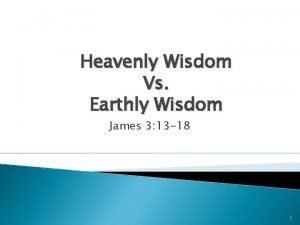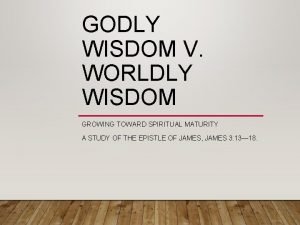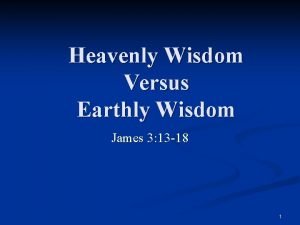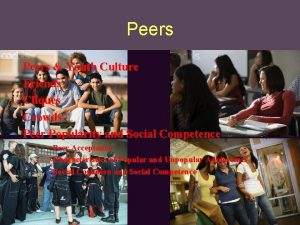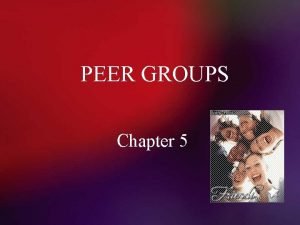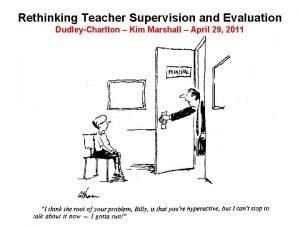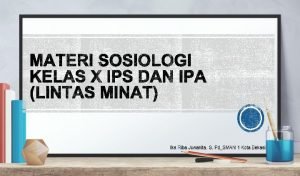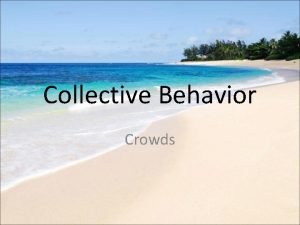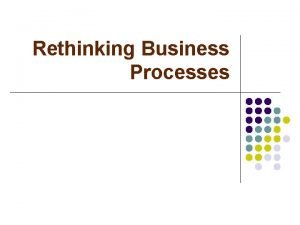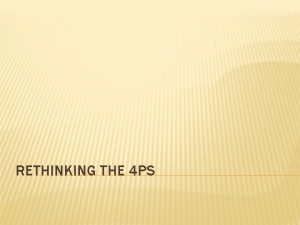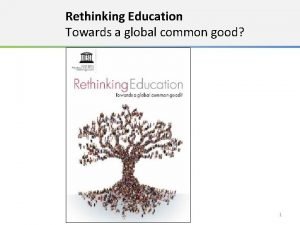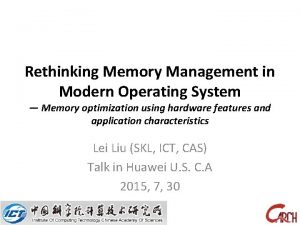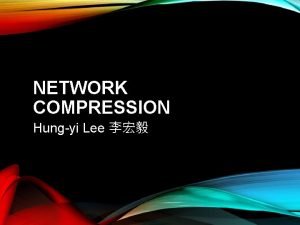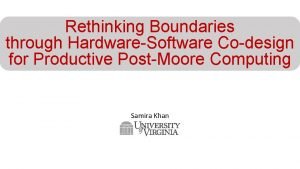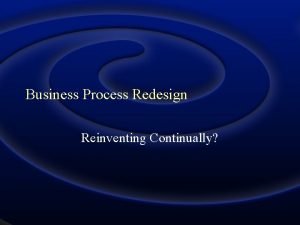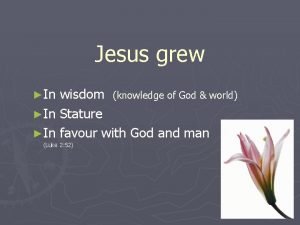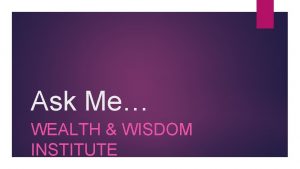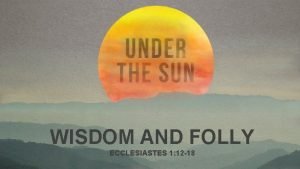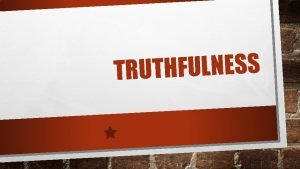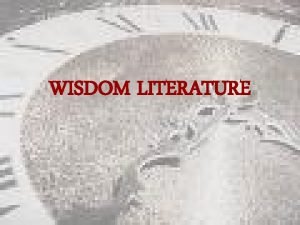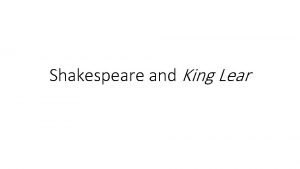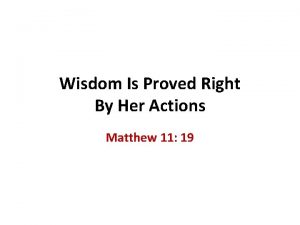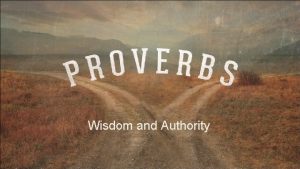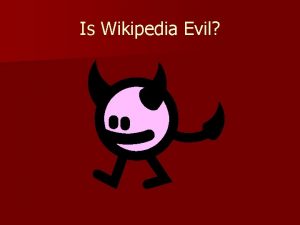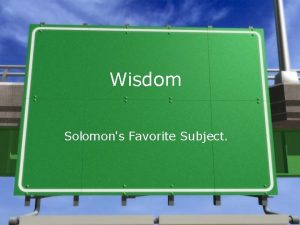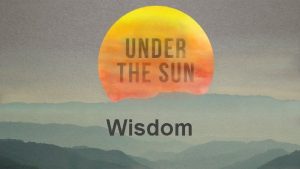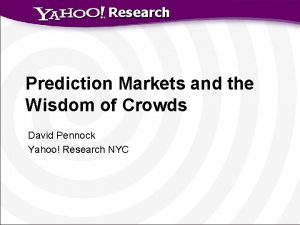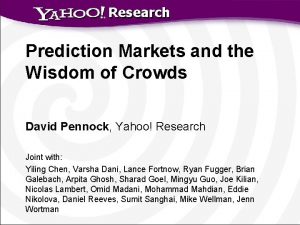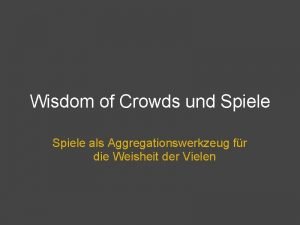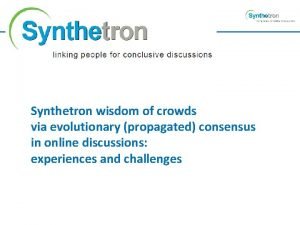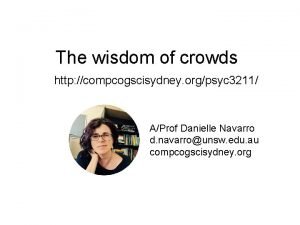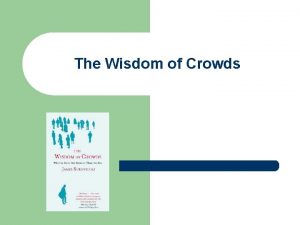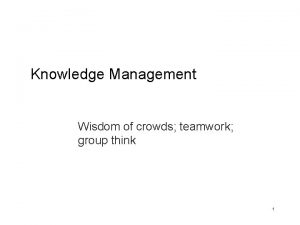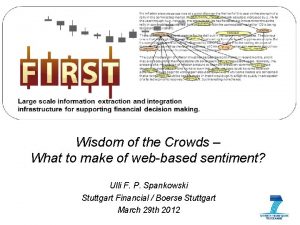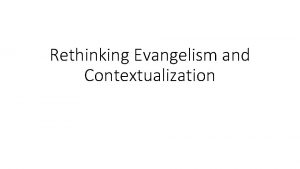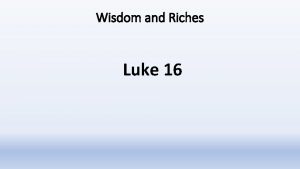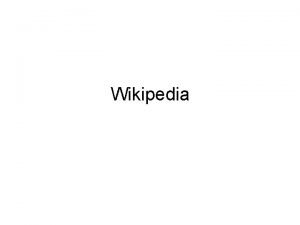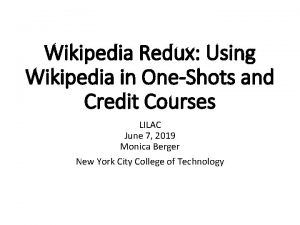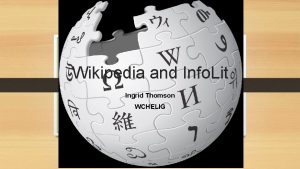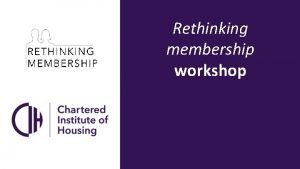Wikipedia and the Wisdom of the Crowds rethinking






















![• “Today, the OED [Oxford English Dictionary] and the Encyclopedia Britannica, two trusted • “Today, the OED [Oxford English Dictionary] and the Encyclopedia Britannica, two trusted](https://slidetodoc.com/presentation_image_h2/92a4fbeaed7f391235b453d0910991da/image-23.jpg)



- Slides: 26

Wikipedia and the Wisdom of the Crowds: re-thinking knowledge creation, reliability and expertise in the age of Wikipedia “Because the world is radically new, the ideal encyclopedia should be radical too. It should stop being safe- in politics, in philosophy, in science. ” -Encyclopedia Britannica Editor Charles Van Doren, 1962. Chris Sweet IWU Faculty Non-Org 3/26/12

My Big Questions • 15 years ago where did you go for information? Who had access to that information? • What is the nature of expertise? • What is meant by “The Wisdom of the Crowds? ” • What is knowledge? Who creates and who controls knowledge? • What is truth?

My Research • “Wikipedia’s Success and the Rise of the Amateur -Expert” in Social Software and the Evolution of User Expertise: Future Trends in Knowledge Creation and Dissemination. IGI Global. Forthcoming. • “Wikipedia and the Making of a (Wo)Man: Biographical Construction in the Digital Age. ” 2010 Joint National Conference of the Popular Culture and American Culture Associations. St. Louis, MO. April 2, 2010.

Stats/History • Live edits: • Michael Jackson’s Wikipedia article was viewed 30 million times in the 2 months following his death (6 million of these in the first 24 hours). • The day Sarah Palin was announced as Mc. Cain’s running mate her Wikipedia page had 2. 4 million views (after a questionable rash of edits to remove controversial material the night before). http: //en. wikipedia. org/w/index. php? title=Special: Recent. Changes&limit=500

• In 2011, the cost for the 32 volumes of the Encyclopedia Britannica was $1395 putting it far out of reach for the vast majority of individuals

• Roots in the open-source movement: • “Given enough eyeballs, all bugs are shallow” -Cathedral and the Bazaar, Eric Raymond • Open source software development was never reliant on experts. Most who contributed had little or no formal training or credentials. • Examples: Linux operating system, Mozilla Firefox browser

Crowdsourcing

Crowdsourcing • Howe defines “crowdsourcing” as “the act of taking a job traditionally performed by a designated agent (usually an employee) and outsourcing it to an undefined, generally large group of people in the form of an open call”

Accuracy & Reliability • Heartland Story • How articles are protected from vandalism – Auto detection – Editor “watch” lists

Studies on Accuracy and Reliability • Nature Study

Epistemic Egalitarianism • “According to epistemic egalitarianism, we are all fundamentally equal in our authority or rights to articulate what should pass for knowledge; the only grounds on which a claim can compete against other claims are to be found in the content of the claim itself, never in who makes it” (2007). • “Wikipedia is a global project. Its special feature is that no one is privileged, and over time, the views of thousands of people are weighed and mixed in. Such an open, welcoming, unfettered institution has a better claim than any other to represent the consensus of Humanity” (Sanger, 2009, p. 58).

How do you like your truth? • “In a world in which so many people are consulting an encyclopedia ‘anyone can edit’ for answers, the conventional wisdom, the accepted knowledge, seems less tethered to experts, exclusive institutions, and publications with professional gatekeepers (Sanger, 2007). • Cory Doctrow: • No, if you want to really navigate the truth via Wikipedia, you have to dig into those "history" and "discuss" pages hanging off of every entry. That's where the real action is, the tidily organized palimpsest of the flamewar that lurks beneath any definition of "truth. " • The Britannica tells you what dead white men agreed upon, Wikipedia tells you what live Internet users are fighting over. • The Britannica truth is an illusion, anyway. There's more than one approach to any issue, and being able to see multiple versions of them, organized with argument and counter-argument, will do a better job of equipping you to figure out which truth suits you best.

How do you like your truth? • One of the major flaws of the traditional model of expertise is that it allows –even encouragesauthorial bias and sometimes fails to take into account dissenting and alternative views. • At the end of the day, Wikipedia is a grand experiment in determining the nature of truth. You, the user, have to decide if truth is a specific product of expertise or whether it can also arise from a democratic process of debating, compromising and eventually settling on a consensus?

What is expertise? • “To me, the key thing is getting it right. I don’t care if they’re a high-school kid or a Harvard professor” -Jimmy Wales • OED definition: “One whose special knowledge or skill causes him to be regarded as an authority; a specialist” (“Expert, ” 2011).

What is expertise? • Cambridge Handbook of Expertise and Expert Performance chooses to cite a 2005 definition of “expert” from Wikipedia: “someone widely recognized as a reliable source of knowledge, technique, or skill whose judgment is accorded authority and status by the public or his or her peers. Experts have prolonged or intense experience through practice and education in a particular field” (Ericsson, Charness, Feltovich, Hoffman, 2006)


The Problems with Experts • Michelene Chi describes seven ways in which experts fall short. 1. Expertise is domain-limited 2. Experts are overly confident 3. Expertise is context dependent 4. Experts can be inflexible 5. Experts sometimes tend to gloss over important aspects, which may lead to inaccurate prediction 6. Experts are judgmental 7. Experts show bias and functional fixedness (Ericsson, et. al. , 2006, pgs. 24 -27).

Who are amateur-experts? Amateur-experts are people who have gained a great deal of specialized knowledge through study or practice, but lack traditional academic or professional credentials.

Wikipedia and Academia • Impact Factor & Open Access • Historian Roy Rosenzweig summarizes this tension between the expert writers and publishers: Why are so many of our scholarly journals locked away behind subscription gates? What about American National Biography Online—written by professional historians, sponsored by our scholarly societies, and supported by millions of dollars in foundation and government grants? Why is it available only to libraries that often pay thousands of dollars per year rather than to everyone on the Web as Wikipedia is? Shouldn't professional historians join in the massive democratization of access to knowledge reflected by Wikipedia and the Web in general? American National Biography Online may be a significantly better historical resource than Wikipedia, but its impact is much smaller because it is available to so few people (The Journal of American History 2006, p. 137 -8).

Wikipedia in the Classroom

Cult of the Amateur Keen defines an “amateur” as, “…a hobbyist, knowledgeable or otherwise, someone who does not make a living from his or her field of interest, a layperson, lacking credentials, a dabbler” (Keen, p. 36)

• “Wittingly or not, we seek out information that mirrors back our own biases and opinions and conforms with our distorted versions of reality. We lose that common conversation or informed debate over our mutuallyagreed upon facts. ” (Keen, p. 83). • “Without editors, fact-checkers, administrators, or regulators to monitor what is being posted, we have no one to vouch for the reliability or credibility of the content we read…There are no gatekeepers to filter truth from fiction, genuine content from advertising, legitimate information from errors or outright deceit” (Keen, p. 64 -5).
![Today the OED Oxford English Dictionary and the Encyclopedia Britannica two trusted • “Today, the OED [Oxford English Dictionary] and the Encyclopedia Britannica, two trusted](https://slidetodoc.com/presentation_image_h2/92a4fbeaed7f391235b453d0910991da/image-23.jpg)
• “Today, the OED [Oxford English Dictionary] and the Encyclopedia Britannica, two trusted reference volumes upon which we have long relied for information, are being replaced by Wikipedia and other user-generated resources…Unlike the OED, which was crafted by a carefully vetted and selected team of experienced professionals, Wikipedia…allows anyone to add and edit entries on its website” (Keen, p. 37).

• 1928 OED: 415, 000 words with 1. 8 million quotations. The great majority of these quotations were culled from the 6 million slips of paper sent in by volunteer amateur readers (Winchester, 1998, p. 109). • Volunteers were recruited: “Without regard to class or standing, qualification or creed, and certainly disregarding gender” (Winchester, 2003, p. 188). • Anyone can volunteer to read and submit to the OED today.

Some conclusions • Truth –in regards to encyclopedia articles- is derived from on-going debate and revision. The wiki platform facilitates these processes. • The wisdom of the crowds should be recognized as a form of expertise that has been greatly enhanced by the internet • Amateur-Experts are now a major force in knowledge creation • The never-ending open review process that Wikipedia articles are based on reduces bias and increases in accuracy over time. • Wikipedia can be used in the classroom to teach concepts such as synthesis of information, evidence, negotiation

• Live edits http: //en. wikipedia. org/w/index. php? title=Special: Recent. Changes&limit=500
 The wisdom of crowds
The wisdom of crowds Godly wisdom vs earthly wisdom
Godly wisdom vs earthly wisdom Godly wisdom vs worldly wisdom
Godly wisdom vs worldly wisdom Earthly and heavenly wisdom
Earthly and heavenly wisdom Crowd vs clique
Crowd vs clique Cliques and crowds
Cliques and crowds Rethinking teacher supervision and evaluation
Rethinking teacher supervision and evaluation Ciri-ciri storming
Ciri-ciri storming Flash crowds
Flash crowds Bustling crowds
Bustling crowds Conventional crowd
Conventional crowd Rethinking business process
Rethinking business process Rethinking engineering education: the cdio approach
Rethinking engineering education: the cdio approach Rethinking the 4 p's
Rethinking the 4 p's Ubígua
Ubígua Rethinking education: towards a global common good?
Rethinking education: towards a global common good? Rethinking file mapping for persistent memory
Rethinking file mapping for persistent memory Rethinking the value of network pruning
Rethinking the value of network pruning Rethinking file mapping for persistent memory
Rethinking file mapping for persistent memory What is the fundamental rethinking of business processes
What is the fundamental rethinking of business processes Grow in wisdom and knowledge
Grow in wisdom and knowledge Wealth and wisdom institute
Wealth and wisdom institute Wisdom and folly
Wisdom and folly Dua for knowledge and wisdom
Dua for knowledge and wisdom The wisdom of proverbs job and ecclesiastes
The wisdom of proverbs job and ecclesiastes King lear story
King lear story Wisdom will be proven right
Wisdom will be proven right

